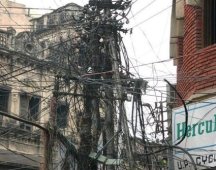The cost to buy energy is anywhere from 25 to 85 cents. If the customer eliminates that cost by using the sun to run his house (when he can) then the customer does not spend 25 cents to 85 cents because he spent 10 cents for the solar energy (up front). He is now 15 to 70 cents better off with solar than without. (during the time he can use the sun) That is not net loss!
If you can use the power from PV rather than buying from utility, yes a big savings.
If you only need lights and A/C in the evening & night, use very little power when your PV array is producing, then the power you backfeed is credited at some small amount, below your cost to produce.
The government mandated putting in enough PV to supply the power your house consumes. Not the power it consumes while you're home. And even then, if A/C and fridge cycle on & off, you end up exporting (for a loss) then importing.
The government should not mandate that people buy more PV than they can put to practical use. Which was done in a round-about way, by mandating PV then changing the net-metering credits.
ROI should be less than 20 years that way imo.
I didn't pick 20 years as time to break even. Rather, a reasonable system life. Perhaps at 20 +/- years, the inverter will need replacement. Although original panels still worked, I realized new panels produced 50% more power in same area, and cost 10% as much, so makes sense to replace.
With net metering, break-even for a commercially installed system might be 5 years given prices in my area. By the end of 20 years, that gives 75% savings (ignoring time value of money). Using net present value or financing the system won't be as beneficial.
I use similar simple amortized approach to consider batteries, but they may reach cycle life sooner than that. Especially lead-acid.
Because DIY PV is so much cheaper than grid power, also cheaper than batteries, I do recommend over-producing. Even if you get little or no credit, it reduces how much grid power used. When peak rates of 3x off peak were moved to the evening, I said "don't buy batteries, just overbuild PV and export 3x as much power". Because I could add 2x the PV panels for same cost as buying a battery.
PG&E is trying to find ways to get money from us even if we don't buy power from them.



